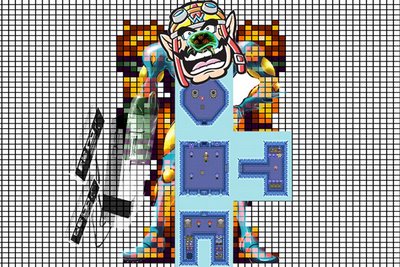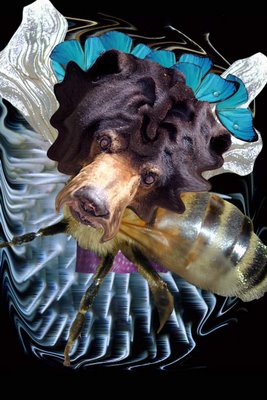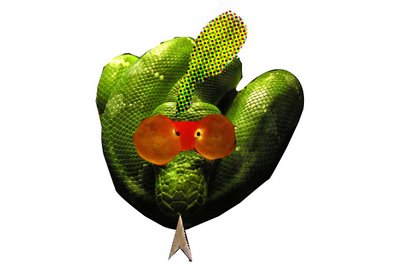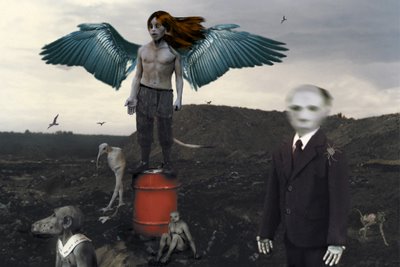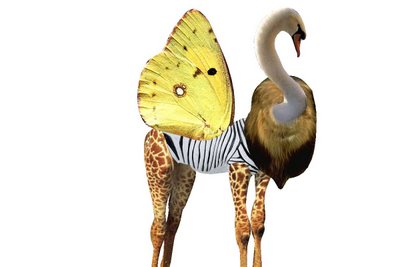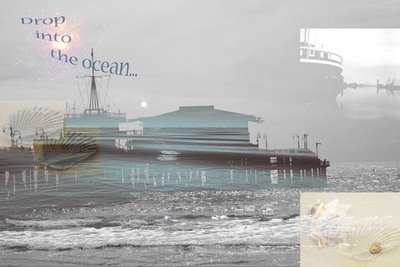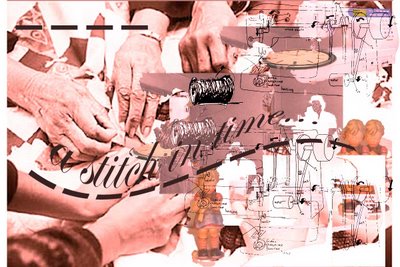Wednesday, April 26, 2006
Monday, April 24, 2006
ROLE PLAYING GAMES by Jo
Playing games is a natural part of human development. They create, among other things, a platform within which to explore our imagination.
Role Playing Games (RPG) give people the opportunity to escape reality, into a world without disease, violence, oppression, poverty and suffering (if one chooses) and the possibility to role play situations one could not assume, or wish to play out, in real life. These games are a form of interactive & collaborative storytelling, deriving from children’s games such as ‘cops and robbers’, ‘families’, ‘doctors and nurses’ etc.
‘Adult’ RPG are based on this idea, but are more sophisticated through the development of character, plot and narrative.
COMPUTER ROLE PLAYING GAMES
Early beginnings in computer generated role playing games brought the creation of such games as ‘Adventure’ by Atari. By popular demand, the development of more complex games evolved into a massive gaming industry, which today encompasses over 50 virtual worlds and millions of users/players.
Players pay a subscription fee, per month, to the game company of their choice withsome users skilled enough to create their own income. For example; in Korea, games have been televised on cable tv, and the players have received prize money and sponsorship deals.
MASSIVELY MULTIPLAYER ONLINE GAMES (MMOG)
MMOG or Massively multiplayer online Role Playing Games (MMORPG) can be played in a variety of settings and users can play alone, or in LAN parties (local area network parties). The most popular, or biggest MMOG, is World of Warcraft (check out www.worldofwarcraft.com) with over 4 million players worldwide, with almost the same amount playing LINEAGE 2 in South Korean alone.
Online text based role playing games are accessed through internet forums and sometimes email or chat programs. These are games where characters are created and weaved into a story and are proving popular amongst the writing community. They can also lead to a form of ‘fan fiction’ where users can role play characters from books, tv and film.
EXAMPLE:
Searching through google site, I eventually came across this game which I logged into and am now a ‘punter’. It is called CANTR 11 (www.cantr.net) It was pretty easy to log into and it is free. It’s a game where one can play whatever character one chooses, as part of a society. Here is a quick introduction of the game (which I copied and pasted) It will help to give you an idea of how the game works.
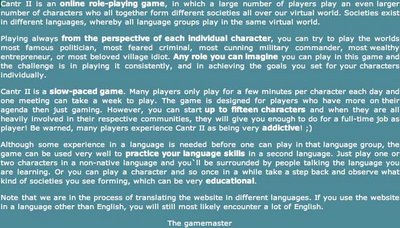
There is a lot of reading involved to get to the first steps, and as noted in the above text, it is a slow-paced game and many players ‘only play for a few minutes per character each day’.
I named my first character Pa Honkey, a male. It takes some time to build characters, and as part of this, you can add some history (inventory) to the characters’ ‘file’. Here’s what I started with:

Pa also introduced himself to the other players and now awaits a reply.
The first few days of playing the game, so the information says, is a little slow, so it will take some time for ‘Pa’ to get on his feet, so to speak. I am looking forward to his progress.
To be continued………http://www.blogger.com/img/gl.link.gif
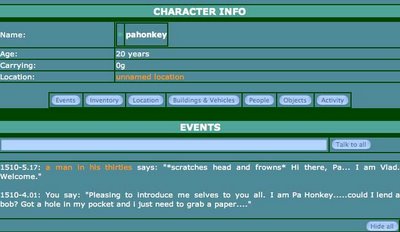
BIBLIOGRAPHY:
Voiceworks: No 64 Autumn 2006
Wikipedia.or/wiki/history_of_role-playing_games – 11/04/06
www.cantr.net
wikipedia.org/wiki/role-playing_game – 11/04/06
www.lordoflords.com
Read more!
Role Playing Games (RPG) give people the opportunity to escape reality, into a world without disease, violence, oppression, poverty and suffering (if one chooses) and the possibility to role play situations one could not assume, or wish to play out, in real life. These games are a form of interactive & collaborative storytelling, deriving from children’s games such as ‘cops and robbers’, ‘families’, ‘doctors and nurses’ etc.
‘Adult’ RPG are based on this idea, but are more sophisticated through the development of character, plot and narrative.
COMPUTER ROLE PLAYING GAMES
Early beginnings in computer generated role playing games brought the creation of such games as ‘Adventure’ by Atari. By popular demand, the development of more complex games evolved into a massive gaming industry, which today encompasses over 50 virtual worlds and millions of users/players.
Players pay a subscription fee, per month, to the game company of their choice withsome users skilled enough to create their own income. For example; in Korea, games have been televised on cable tv, and the players have received prize money and sponsorship deals.
MASSIVELY MULTIPLAYER ONLINE GAMES (MMOG)
MMOG or Massively multiplayer online Role Playing Games (MMORPG) can be played in a variety of settings and users can play alone, or in LAN parties (local area network parties). The most popular, or biggest MMOG, is World of Warcraft (check out www.worldofwarcraft.com) with over 4 million players worldwide, with almost the same amount playing LINEAGE 2 in South Korean alone.
Online text based role playing games are accessed through internet forums and sometimes email or chat programs. These are games where characters are created and weaved into a story and are proving popular amongst the writing community. They can also lead to a form of ‘fan fiction’ where users can role play characters from books, tv and film.
EXAMPLE:
Searching through google site, I eventually came across this game which I logged into and am now a ‘punter’. It is called CANTR 11 (www.cantr.net) It was pretty easy to log into and it is free. It’s a game where one can play whatever character one chooses, as part of a society. Here is a quick introduction of the game (which I copied and pasted) It will help to give you an idea of how the game works.

There is a lot of reading involved to get to the first steps, and as noted in the above text, it is a slow-paced game and many players ‘only play for a few minutes per character each day’.
I named my first character Pa Honkey, a male. It takes some time to build characters, and as part of this, you can add some history (inventory) to the characters’ ‘file’. Here’s what I started with:

Pa also introduced himself to the other players and now awaits a reply.
The first few days of playing the game, so the information says, is a little slow, so it will take some time for ‘Pa’ to get on his feet, so to speak. I am looking forward to his progress.
To be continued………http://www.blogger.com/img/gl.link.gif

BIBLIOGRAPHY:
Voiceworks: No 64 Autumn 2006
Wikipedia.or/wiki/history_of_role-playing_games – 11/04/06
www.cantr.net
wikipedia.org/wiki/role-playing_game – 11/04/06
www.lordoflords.com
Read more!
Thursday, April 20, 2006
CALL FOR ABSTRACTS: Mesh #19 Global/ Regional Perspectives
Experimenta’s annual media arts journal (online) will be launched on the Experimenta website in September 2006.
MESH #19 will be an online issue providing a global overview of contemporary media arts practice and the creative application of new technological developments through articles that focus on local practice in specific regions. This issue will focus on the critical, aesthetic and technological aspects related to screen culture and media arts practice, balancing the conceptual issues facing media arts culture with the social/cultural, economic and political contexts in which the practices exist.
Articles are sought from curators, artists, academics, media commentators and theorists about practices in the following regions:
• West & East Europe
• Africa
• Middle East
• Asia Pacific
• The Americas
Criteria
• maximum word length: 2000 words;
• the article should use plain language as it is for a general readership;
• the article must cite at least 3 recent media artworks;
• images with copyright clearance are to be sourced by the author.
Deadline: Friday 5 May 2006 for the submission of 100 word abstracts
Payment
An honorarium is available. Academics are eligible to have their paper refereed.
For examples of previous online and printed issues of MESH, please visit: www.experimenta.org
Detailed brief
We are seeking to publish articles on contemporary Media Arts that are an expression of current cultural movements in each region. Typically artworks evolve from the socio/cultural/political environment and provide an insight into cultural phenomena. We are looking for articles that explore current trends in the creative applications of technological development, the cultural contexts from which media art practice emerges, and cultural reactions to the practice and exhibition of media art.
The following are some guidelines indicating the structure, language and content of the articles we are seeking.
Articles should be;
• In English;
• Comprehensive and the result of thorough research;
• About a range of media artforms including hybrid practices;
• Focussed on particular artworks;
• About current practices;
• Providing commentary and analysis;
• Using plain language with minimal jargon;
• Describing the experience for the audience and could include specific audience responses and perspectives.
Articles should not be;
• Reviewing only one individual artist or artwork;
• An exhibition review or book review;
• About Media Arts in general;
• A comparison of practices in two or more regions;
• Presenting solely an historical focus, although some reference to previous New Media works may be required for commentary and comparison.
Contact Maria Rizzo for submissions, more information and for a copy of Experimenta’s writers’ style guide; maria@experimenta.org
Read more!
MESH #19 will be an online issue providing a global overview of contemporary media arts practice and the creative application of new technological developments through articles that focus on local practice in specific regions. This issue will focus on the critical, aesthetic and technological aspects related to screen culture and media arts practice, balancing the conceptual issues facing media arts culture with the social/cultural, economic and political contexts in which the practices exist.
Articles are sought from curators, artists, academics, media commentators and theorists about practices in the following regions:
• West & East Europe
• Africa
• Middle East
• Asia Pacific
• The Americas
Criteria
• maximum word length: 2000 words;
• the article should use plain language as it is for a general readership;
• the article must cite at least 3 recent media artworks;
• images with copyright clearance are to be sourced by the author.
Deadline: Friday 5 May 2006 for the submission of 100 word abstracts
Payment
An honorarium is available. Academics are eligible to have their paper refereed.
For examples of previous online and printed issues of MESH, please visit: www.experimenta.org
Detailed brief
We are seeking to publish articles on contemporary Media Arts that are an expression of current cultural movements in each region. Typically artworks evolve from the socio/cultural/political environment and provide an insight into cultural phenomena. We are looking for articles that explore current trends in the creative applications of technological development, the cultural contexts from which media art practice emerges, and cultural reactions to the practice and exhibition of media art.
The following are some guidelines indicating the structure, language and content of the articles we are seeking.
Articles should be;
• In English;
• Comprehensive and the result of thorough research;
• About a range of media artforms including hybrid practices;
• Focussed on particular artworks;
• About current practices;
• Providing commentary and analysis;
• Using plain language with minimal jargon;
• Describing the experience for the audience and could include specific audience responses and perspectives.
Articles should not be;
• Reviewing only one individual artist or artwork;
• An exhibition review or book review;
• About Media Arts in general;
• A comparison of practices in two or more regions;
• Presenting solely an historical focus, although some reference to previous New Media works may be required for commentary and comparison.
Contact Maria Rizzo for submissions, more information and for a copy of Experimenta’s writers’ style guide; maria@experimenta.org
Read more!
Wednesday, April 19, 2006
Appeal for immediate action
Appeal to the editorial boards participating in documenta 12 magazines as well as to other joint magazines, editors, writers etc.
My name is Keiko Sei, I am a researcher and coordinator for “documenta 12 magazines” with responsibility for the Southeast Asian region.
This letter is being sent to you as a coordinated appeal in agreement with the editor in chief of “documenta 12 magazines,” Georg Schöllhammer. We herewith call upon the editorial boards participating in this project as well as upon other magazines, editors, and writers to form a campaign group, “Friends of Fa Diew Kan” in an immediate action. We intend to demand that the Thai government lift its ban on the political quarterly “Fah Diew Kan” (Under the same sky), a contributor to “documenta 12 magazines,” whose editor, Thanapol Eawsakul, is facing charges of lèse-majesté.
“documenta 12 magazines” is not simply a publication; it also intends to create a network of editorial boards of periodicals and online media such as yours, as well as a forum of long-term exchange. I have learned that the participating magazines are renowned and highly prolific publications from different countries that are doing extremely important work. During my research in Southeast Asia, I’ve come across many brilliant and intelligent editors who are striving to serve the community by providing citizens with accurate information, critical analysis and educational materials in a region where democracy is not yet the norm—not one of the ASEAN nations has an impeccable reputation for democracy, and freedom of expression is extremely restricted.
Thailand, however, has been on a good course toward developing a decent democracy, especially after the big movements in 1974, 1976, and 1992—a long battle that required many sacrifices and tremendous efforts of different civic groups and people in the media and in education. These efforts made it possible for people to grow up as educated and informed citizens. It is these educated citizens, who have started to question the long-term effect of what is called Thaksinomics under Prime Minster Thaksin Shinawatra. They form the core of the recent campaign to oust the prime minister. At the same time, these same citizens are debating what methods are appropriate, because some methods would be counter to democracy. Debates, discussions and forums have sprung up in numerous places. It was a great pleasure for me to meet the editors of printed periodicals and online media who have provided the citizens with the basis for those forums, and the basis for thought. The team of “documenta 12
magazines” has been looking forward to work with them for the documenta magazine project.
One of those magazine editors, however, has recently been charged by the Thai police with lèse-majesté. His political quarterly, “Fah Diew Kan” (Under the same sky), has been banned. The latest issue of the magazine is about the Thai monarchy and this issue was targeted (see
the enclosed news articles from the English daily “Bangkok Post” and “The Nation”). The charge of lèse-majesté has been used recently by both pro-Thaksin and anti-Thaksin groups with increasing frequency as a way to damage each other. Some pro-Thaksin groups recently harassed the Nation publishing group under the pretext that one article constituted lèse-majesté and forced the Thai language daily “Kom Chad Luek” to close for five days. The same group is said to be behind the charge against “Fah Diew Kan” and its publisher and editor, Thanapol Eawsakul (the magazine was banned on an earlier occasion when it
criticized government policy in the south and distributed a VCD of the Tak Bai incident*). Lèse-majesté has become a political tool, and the magazine and its publisher/editor has fallen victim to it. Most of the countries in the world today do not prosecute their citizens
for lèse-majesté. Thailand is thus an exception, and this charge against our fellow editor is an exceptional one as well.
When I researched the situation of printed periodicals and online media in Thailand, I found that magazines that address thought-provoking topics and contain serious articles of quality are a strong asset of, and for, the country. The same publisher publishes books on peace studies and designed a highly educational exhibition about the political history of Thailand. The issue focusing on the Thai monarchy was also intended to educate citizens and to provide
information on that institution from perspectives very different from the very official one—a topic that is usually avoided by most of the publishers and editors, who prefer to play it safe. It was thus courageous for the publisher to take on the issue, and now he is
paying a price.
But does he have to? If we step up the pressure from the international community, it will surely affect the decision of the Thai Ministry of Interior. In the past, the prominent case of lèse-majesté charges against the prominent thinker and committed Buddhist Sulak Sivaraksa, whose interview article on the monarchy has been published in the banned edition of “Fah Diew Kan,” caught international attention and he won the cases with the help of international pressure (the latest report says that because of the interview article he is now facing a third charge of lèse-majesté). In Thailand, four journalistic associations—the Thai Journalists
Association, the Thai Broadcast Journalists Association, the Press Council of Thailand, and the Economic Reporters Association—have launched a campaign to bolster press freedom and freedom of expression, and in this particular case of “Fah Diew Kan,” Asian Human Rights Commission has launched an urgent action (see http://www.ahrchk.net/ua/mainfile.php/2006/1631/) and Reporters without Borders (Reporters sans frontières) expressed dismay (http://www.rsf.org/article.php3?id_article=16956) over this and other similar cases in Thailand.
Georg Schöllhammer, the chief editor of the “documenta magazines” and I agreed to form a campaign group “Friends of Fa Diew Kan” in an immediate action. We would like to appeal to the fellow editors, publishers, writers,and scholars to join the group in order to exert pressure to the Thai government to lift the ban of the magazine and the charge against its publisher/editor. Therefore, we ask you to please send:
1. your name
2. the name of your magazine
3. your contact address
4. your statement, if you have any, to the Thai government
5. your message, if you have any, to the publisher/editor Thanapol Eawsakul to this e-mail address: publications@documenta.de
We will forward your statements and the petition to the Ministry of Interior and other concerned agencies as well as to the Thai press, and your message to the publisher/editor. We would also be very grateful if you could inform fellow publishers and editors in your
community to join the campaign as well. Please note, however, that the aim of this campaign is not to raise the question of whether or not Thailand should cease to punish lèse-majesté as a crime. The issue we would like to raise is rather the authorities’ abuse of the law as a way to suppress freedom of the press for political ends (the Thaksin government has used charges of defamation, as well as lèse-majesté, many times).
The goal of this campaign is not only to support the general principle of press freedom and freedom of expression; both Georg Schöllhammer and I would also like to demonstrate our responsibility to all the editors and publishers with whom we are working. We would like to ensure as best we can that they are able work in a safe and free environment.
Keiko Sei : Coordinating Editor
documenta 12 magazines
Bangkok, April 4, 2006
* A summary of the Tak Bai incident is available at:
http://en.wikipedia.org/wiki/South_Thailand_insurgency
Read more!
My name is Keiko Sei, I am a researcher and coordinator for “documenta 12 magazines” with responsibility for the Southeast Asian region.
This letter is being sent to you as a coordinated appeal in agreement with the editor in chief of “documenta 12 magazines,” Georg Schöllhammer. We herewith call upon the editorial boards participating in this project as well as upon other magazines, editors, and writers to form a campaign group, “Friends of Fa Diew Kan” in an immediate action. We intend to demand that the Thai government lift its ban on the political quarterly “Fah Diew Kan” (Under the same sky), a contributor to “documenta 12 magazines,” whose editor, Thanapol Eawsakul, is facing charges of lèse-majesté.
“documenta 12 magazines” is not simply a publication; it also intends to create a network of editorial boards of periodicals and online media such as yours, as well as a forum of long-term exchange. I have learned that the participating magazines are renowned and highly prolific publications from different countries that are doing extremely important work. During my research in Southeast Asia, I’ve come across many brilliant and intelligent editors who are striving to serve the community by providing citizens with accurate information, critical analysis and educational materials in a region where democracy is not yet the norm—not one of the ASEAN nations has an impeccable reputation for democracy, and freedom of expression is extremely restricted.
Thailand, however, has been on a good course toward developing a decent democracy, especially after the big movements in 1974, 1976, and 1992—a long battle that required many sacrifices and tremendous efforts of different civic groups and people in the media and in education. These efforts made it possible for people to grow up as educated and informed citizens. It is these educated citizens, who have started to question the long-term effect of what is called Thaksinomics under Prime Minster Thaksin Shinawatra. They form the core of the recent campaign to oust the prime minister. At the same time, these same citizens are debating what methods are appropriate, because some methods would be counter to democracy. Debates, discussions and forums have sprung up in numerous places. It was a great pleasure for me to meet the editors of printed periodicals and online media who have provided the citizens with the basis for those forums, and the basis for thought. The team of “documenta 12
magazines” has been looking forward to work with them for the documenta magazine project.
One of those magazine editors, however, has recently been charged by the Thai police with lèse-majesté. His political quarterly, “Fah Diew Kan” (Under the same sky), has been banned. The latest issue of the magazine is about the Thai monarchy and this issue was targeted (see
the enclosed news articles from the English daily “Bangkok Post” and “The Nation”). The charge of lèse-majesté has been used recently by both pro-Thaksin and anti-Thaksin groups with increasing frequency as a way to damage each other. Some pro-Thaksin groups recently harassed the Nation publishing group under the pretext that one article constituted lèse-majesté and forced the Thai language daily “Kom Chad Luek” to close for five days. The same group is said to be behind the charge against “Fah Diew Kan” and its publisher and editor, Thanapol Eawsakul (the magazine was banned on an earlier occasion when it
criticized government policy in the south and distributed a VCD of the Tak Bai incident*). Lèse-majesté has become a political tool, and the magazine and its publisher/editor has fallen victim to it. Most of the countries in the world today do not prosecute their citizens
for lèse-majesté. Thailand is thus an exception, and this charge against our fellow editor is an exceptional one as well.
When I researched the situation of printed periodicals and online media in Thailand, I found that magazines that address thought-provoking topics and contain serious articles of quality are a strong asset of, and for, the country. The same publisher publishes books on peace studies and designed a highly educational exhibition about the political history of Thailand. The issue focusing on the Thai monarchy was also intended to educate citizens and to provide
information on that institution from perspectives very different from the very official one—a topic that is usually avoided by most of the publishers and editors, who prefer to play it safe. It was thus courageous for the publisher to take on the issue, and now he is
paying a price.
But does he have to? If we step up the pressure from the international community, it will surely affect the decision of the Thai Ministry of Interior. In the past, the prominent case of lèse-majesté charges against the prominent thinker and committed Buddhist Sulak Sivaraksa, whose interview article on the monarchy has been published in the banned edition of “Fah Diew Kan,” caught international attention and he won the cases with the help of international pressure (the latest report says that because of the interview article he is now facing a third charge of lèse-majesté). In Thailand, four journalistic associations—the Thai Journalists
Association, the Thai Broadcast Journalists Association, the Press Council of Thailand, and the Economic Reporters Association—have launched a campaign to bolster press freedom and freedom of expression, and in this particular case of “Fah Diew Kan,” Asian Human Rights Commission has launched an urgent action (see http://www.ahrchk.net/ua/mainfile.php/2006/1631/) and Reporters without Borders (Reporters sans frontières) expressed dismay (http://www.rsf.org/article.php3?id_article=16956) over this and other similar cases in Thailand.
Georg Schöllhammer, the chief editor of the “documenta magazines” and I agreed to form a campaign group “Friends of Fa Diew Kan” in an immediate action. We would like to appeal to the fellow editors, publishers, writers,and scholars to join the group in order to exert pressure to the Thai government to lift the ban of the magazine and the charge against its publisher/editor. Therefore, we ask you to please send:
1. your name
2. the name of your magazine
3. your contact address
4. your statement, if you have any, to the Thai government
5. your message, if you have any, to the publisher/editor Thanapol Eawsakul to this e-mail address: publications@documenta.de
We will forward your statements and the petition to the Ministry of Interior and other concerned agencies as well as to the Thai press, and your message to the publisher/editor. We would also be very grateful if you could inform fellow publishers and editors in your
community to join the campaign as well. Please note, however, that the aim of this campaign is not to raise the question of whether or not Thailand should cease to punish lèse-majesté as a crime. The issue we would like to raise is rather the authorities’ abuse of the law as a way to suppress freedom of the press for political ends (the Thaksin government has used charges of defamation, as well as lèse-majesté, many times).
The goal of this campaign is not only to support the general principle of press freedom and freedom of expression; both Georg Schöllhammer and I would also like to demonstrate our responsibility to all the editors and publishers with whom we are working. We would like to ensure as best we can that they are able work in a safe and free environment.
Keiko Sei : Coordinating Editor
documenta 12 magazines
Bangkok, April 4, 2006
* A summary of the Tak Bai incident is available at:
http://en.wikipedia.org/wiki/South_Thailand_insurgency
Read more!
Check Course Outline
I have updated your course outline to reflect the extension for the assignment. Please note that I will be adjusting it further as we go along to reflect the needs of the majority of the class as they are conveyed to me. So don't hesitate to let me know if you think that the pace that we are getting through stuff is too fast/slow
Read more!
Read more!
Machinima Film Festival
Saturday 6 and Sunday 7th May ACMI Cinemas
Complimenting the Games Lab Machinima exhibition, ACMI Cinemas will present, direct from New York, the 2006 Machinima Film Festival including a screening of Red vs. Blue Season 3 followed by a Q&A with Burnie Burns, Gus Sorola, Matt Hullum, Jason Saldana and Kathleen Zuelch from Rooster Teeth.
Saturday 6th May 2.30pm > Full $13 Concession $10
Red Vs Blue Season 3
Following 2004's sell-out screenings of the phenomenon that is Red vs. Blue, ACMI screens Season 3, plus a Q&A with Burnie Burns, Gus Sorola, Matt Hullum, Jason Saldana and Kathleen Zuelch from Rooster Teeth.
Saturday 6th May 5pm > Full $13 Concession $10
Machinima 101
Sample the delights of the Machinima Film Festival in this selection of work presented by festival director, Paul Marino.
Sunday 7th May 10am > Full $20 Concession $15
Machinima Film Festival Showcase
Join Paul Marino, Director of the Machinima Film Festival, and members from Rooster Teeth for a full day featuring screenings of current award-winning work, a master class and a panel discussion which examines machinima's wider cultural, and aesthetic ramifications. Screening highlights include 2005 Festival Winner for Best Series This Spartan Life, a talk show set in Halo (online), Rooster Teeth's P.A.N.I.C.S, winner of Excellence in Machinima Writing plus obscure new gems in this exciting new medium.
The Machinima Film Festival is presented by the Academy of Machinima Arts & Science.
For more festival details and tickets visit http://www.acmi.net.au/playingthemovies.jsp or phone ACMI box office on (+61 3) 8663 2583 between 10am - 6pm AEST. Please Note: These sessions are Unclassified 15+ so people under the age of 15 will need to be accompanied by a parent or adult guardian.
Read more!
Complimenting the Games Lab Machinima exhibition, ACMI Cinemas will present, direct from New York, the 2006 Machinima Film Festival including a screening of Red vs. Blue Season 3 followed by a Q&A with Burnie Burns, Gus Sorola, Matt Hullum, Jason Saldana and Kathleen Zuelch from Rooster Teeth.
Saturday 6th May 2.30pm > Full $13 Concession $10
Red Vs Blue Season 3
Following 2004's sell-out screenings of the phenomenon that is Red vs. Blue, ACMI screens Season 3, plus a Q&A with Burnie Burns, Gus Sorola, Matt Hullum, Jason Saldana and Kathleen Zuelch from Rooster Teeth.
Saturday 6th May 5pm > Full $13 Concession $10
Machinima 101
Sample the delights of the Machinima Film Festival in this selection of work presented by festival director, Paul Marino.
Sunday 7th May 10am > Full $20 Concession $15
Machinima Film Festival Showcase
Join Paul Marino, Director of the Machinima Film Festival, and members from Rooster Teeth for a full day featuring screenings of current award-winning work, a master class and a panel discussion which examines machinima's wider cultural, and aesthetic ramifications. Screening highlights include 2005 Festival Winner for Best Series This Spartan Life, a talk show set in Halo (online), Rooster Teeth's P.A.N.I.C.S, winner of Excellence in Machinima Writing plus obscure new gems in this exciting new medium.
The Machinima Film Festival is presented by the Academy of Machinima Arts & Science.
For more festival details and tickets visit http://www.acmi.net.au/playingthemovies.jsp or phone ACMI box office on (+61 3) 8663 2583 between 10am - 6pm AEST. Please Note: These sessions are Unclassified 15+ so people under the age of 15 will need to be accompanied by a parent or adult guardian.
Read more!
Friday, April 14, 2006
Tuesday, April 11, 2006
Assignment extension
There is a general extension on assignment #2 until the 8th May. You are, of course, very welcome to hand it in earlier if you wish.
I'll be re-jigging the course outline to include 2 more photoshop classes after Easter.
Read more!
I'll be re-jigging the course outline to include 2 more photoshop classes after Easter.
Read more!
Monday, April 10, 2006
Tonight
Sorry all -- I should have got to this earlier... tonight we'll be finishing the exercise from last week and working on your assignments so bring along any source files you might have so far...
Read more!
Read more!
Thursday, April 06, 2006
THE FOURTH ANGRY FILM FESTIVAL CALL FOR ENTRIES
Entry Deadline is 14th April. Download entry forms. Email Tom if you have any problems at vogeldesign@optusnet.com.au. The only criteria is that films need to be under 15 min and DVD format is preferred.
Entries received so far can be viewed at the web site. So get busy and send in your short film so that they can be added to the entry page. The finalists will be chosen from what you see there.
Read more!
Entries received so far can be viewed at the web site. So get busy and send in your short film so that they can be added to the entry page. The finalists will be chosen from what you see there.
Read more!
Sunday, April 02, 2006
MUSRUM: Extracts from the Original Documents
¶There was little excuse for the invention of the name MUSRUM. It was already known in sixteen principalities and native states.
¶There were, however, several religious reasons, but these are unlikely to become evident in what follows.
¶Musrum is terribly afraid of sponge-cats.
¶Keep your sponge-cats under control…
¶The kingdom of Intersol slopes down for a hundred miles through blue flax plantations to the sea and oblivion.
¶The Tran-Siberian Railway was established to facilitate the construction of the Far East.
¶Every hour, on the precise stroke, trains leave Moscow bearing Musrum and his relations in tears.
¶Gilvis wrote a Book of Life for the dead.
¶He is probably writing your biography at this moment.
¶A sponge-cat weeps after the Moscovite trains. Musrum also weeps, but in another room.
¶Sudden prayers make God jump.
Read more!
¶There were, however, several religious reasons, but these are unlikely to become evident in what follows.
¶Musrum is terribly afraid of sponge-cats.
¶Keep your sponge-cats under control…
¶The kingdom of Intersol slopes down for a hundred miles through blue flax plantations to the sea and oblivion.
¶The Tran-Siberian Railway was established to facilitate the construction of the Far East.
¶Every hour, on the precise stroke, trains leave Moscow bearing Musrum and his relations in tears.
¶Gilvis wrote a Book of Life for the dead.
¶He is probably writing your biography at this moment.
¶A sponge-cat weeps after the Moscovite trains. Musrum also weeps, but in another room.
¶Sudden prayers make God jump.
From Musrum by Eric Thacker aand Anthony Earnshaw
Read more!
Monday --Typography
No need to bring anything this week -- we'll be constructing on the spot.
Read more!
Read more!
